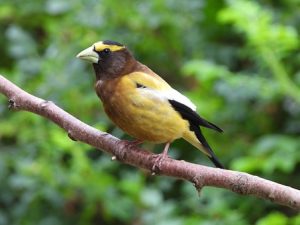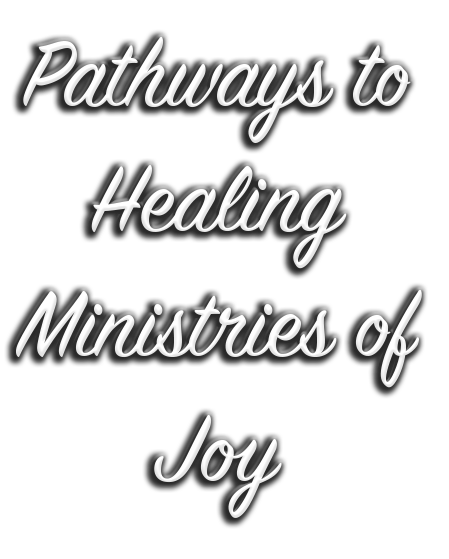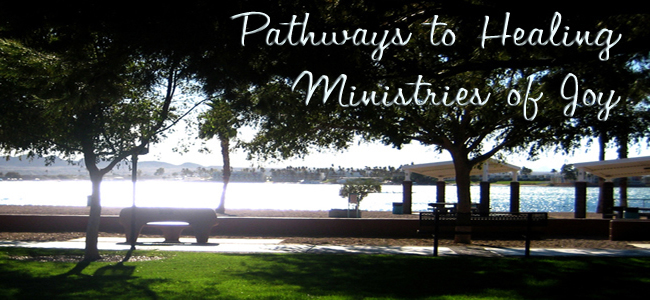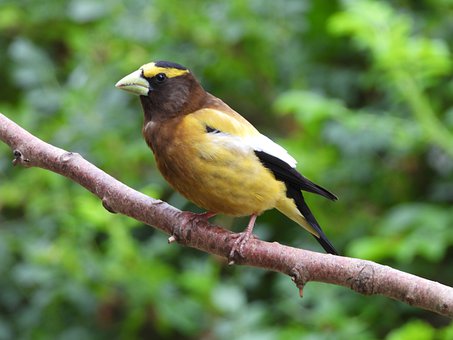 Nature speaks, when we listen. Perhaps birds can be the most frequent bearers of messages. While in Idaho, walking along a hillside, I met with an Evening Grosbeak. The breeze blew the feathers of his head straight up as he lingered on a bush. But the remarkable moments came while watching this bird fly.
Nature speaks, when we listen. Perhaps birds can be the most frequent bearers of messages. While in Idaho, walking along a hillside, I met with an Evening Grosbeak. The breeze blew the feathers of his head straight up as he lingered on a bush. But the remarkable moments came while watching this bird fly.
Although the pumping motion of his wings seemed adequate, the little creature was constantly sinking. Only short flights could be made from one tall weed to another in order to stay airborne.
Suffering from some unseen loss or wound, this bird let me get much closer than he otherwise would have allowed. But three feet was his limit, then he would plunge ahead. We traveled together like this for several hundred feet before he circled back into the subdivision and flew up to a doorway to find rest upon a light fixture. Vulnerable, without benefit of help, no doubt he would soon fall prey to a hungry predator, unless perchance a child with a B-B gun reached this wounded one first.
I thought of the similarity between the plight of the bird and that of suffering humans. When hurt, physically, mentally or emotionally, it is necessary to “fly low.” Life must be taken in short distances; forced rest comes often. It is difficult and sometimes impossible to fend without help. There is a greater need to let others move in close—far closer than normally would be needed. Such state of life seems to invite “pot shots” from those who lack understanding, are prone to criticism or judgment: “Can’t you fly a wee bit higher? Carry a little more of the load? Get squared away and not mope?”
Human intelligence can be a two-edged sword. The injured ones know what they have lost. There are memories of soaring high, times of having “wings on our feet,” while tasting the pleasure that comes with providing for self and others. The sorrow of loss stings and constantly must be fielded.
Yet, this same gift of intelligence grants the power to supersede, to persevere—even transpose valleys into celestial realms unseen by the human eye. How can this be done? By acknowledging Christ, developing ears to hear His voice and the ability to respond in the spirit of the Psalmist:
The Lord is my shepherd; I shall not want . . . You prepare a table before me in the presence of my enemies; You anoint my head with oil; My cup runs over. Surely goodness and mercy shall follow me all the days of my life; and I will dwell in the house of the LORD forever,” (Psalms 23:1-6).
Clearly, it is possible to see Christ’s touch through the hands and hearts of others. While captured in a bed, while sick, one learns to lie still and know that God is there. Then when released again in the land of the living, there can be praise, exclamations of thanksgiving—for the gift of life resumed, even though it is not painless.
Human choice rules here. Some choose to draw inward, shrinking from loving help. Like Carl, a stroke victim and amputee who said, “I’ve learned two lessons in life: Mind your own business. And don’t need anyone!” A felt gloom rose from his trap of bitterness. Obviously, his eyes were blinded; he could not see God all about him—nurses, doctors, therapists, dressings, medicine, plus a meal being wheeled in as he spoke. How I wanted to touch him with love, but like the little bird on the hillside Carl only felt safe in keeping his distance.
The subject of suffering has been addressed by many minds finer than mine. All of us have struggled with the questions of it. But, may each of us – sufferer and health-bearer alike—not fail to see the velvet glove of God present in every hour of pain or pleasure. May the able-bodied not “fly so high,” or so fast as to fail hearing the words of a troubled heart. It only takes a moment to stroke a trembling hand. May we lay down the “B-B guns.” For, that is Christ in that hospital bed, that wheelchair, in that quiet, lonely home. It is Christ behind that depressed or anxious face. Countless people wait for the sound of a ringing phone. Do we care?
The speed of life is a force to be reckoned with. There are slower lanes, which can be chosen, granting time to walk a mile with those who are there without choice. Is this our “road to Emmaus,” where Christ is not so easily recognized, yet right there with us?



What a profound and beautiful message, Joy. I felt very moved, inspired and had a sense of peace, with renewed faith that Christ will always be there through the difficult times. Thank you for your wonderful message.
With Love,
Leslie
Such a salient message of comfort for what I am feeling in my life right now! All around me there is sickness, decrease in abilities due to aging, demands on time, waning energy, need for more prayers, never ending.
Flying low right now feels bad because I have experienced what it feels like to “fly high”!
Thank you, Mjo, for writing in such a way that others can no doubt relate. I am sitting at my PC this morning praying for you and for all who are struggling in similar ways. Press into God’s Word (the Bible) for comfort. Write back if you would like a list of my favorites. Or, go to my homepage http://www.healinglifespain.com. On the left side, click “Quick Aids.” This will bring a list that includes a “help” titled “Emergency” #s. I know you will appreciate that list and some of the other helps offered there may well lift you up. Sending love to you, and all who are hurting at this time.
So insightful, we all have the choice to be alive and thrive in vulnerable situations, love God and love people. Or, we can hide our light under a bushel, and allow the enemy to burrow a stronghold of bitterness within us. That is a living breathing death sentence.
Thank you, Rich, for your words. They are powerful, such as truth always is. Isn’t it wonderful that we don’t have to be perfect to be loved! Write often. That is my hope as you have much to say.